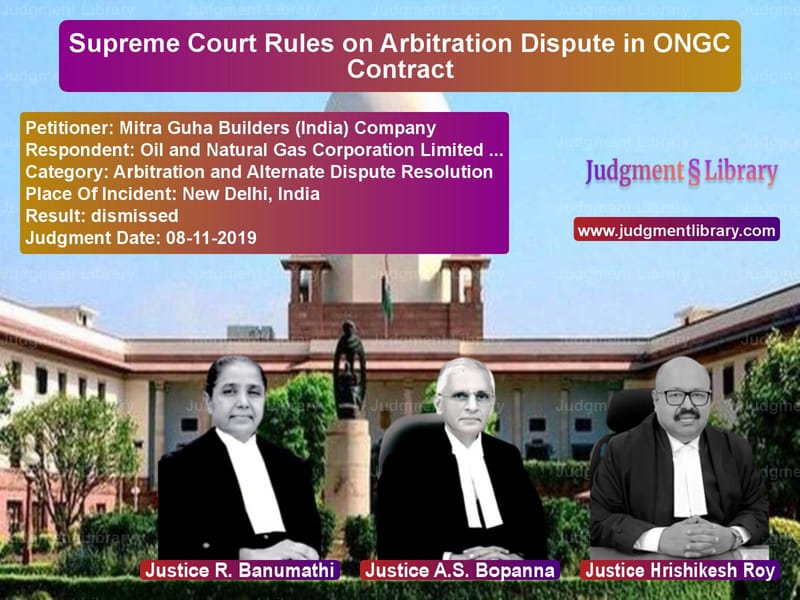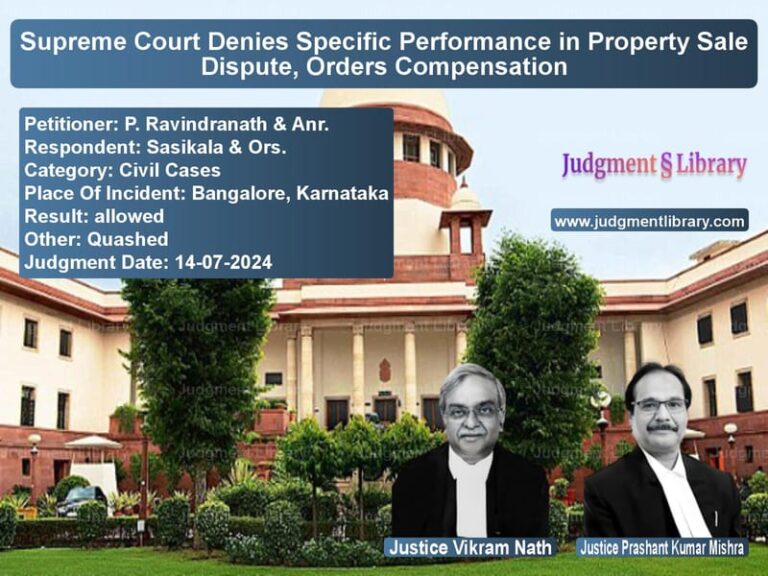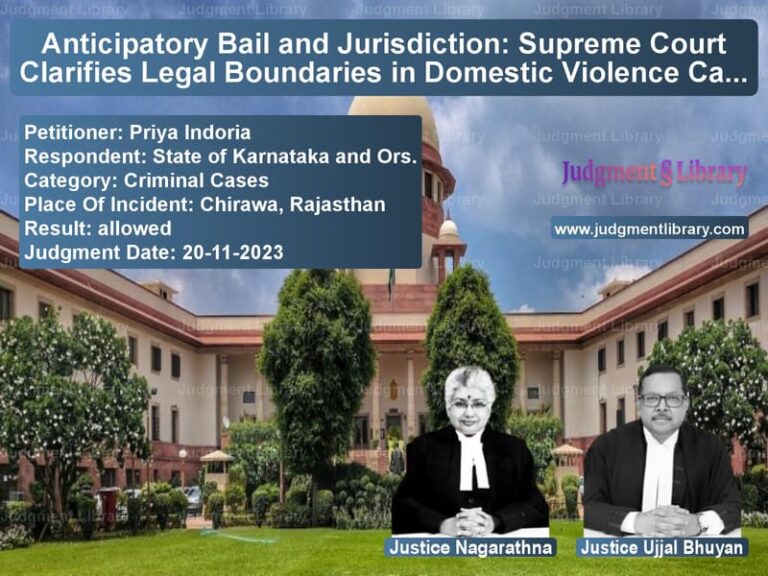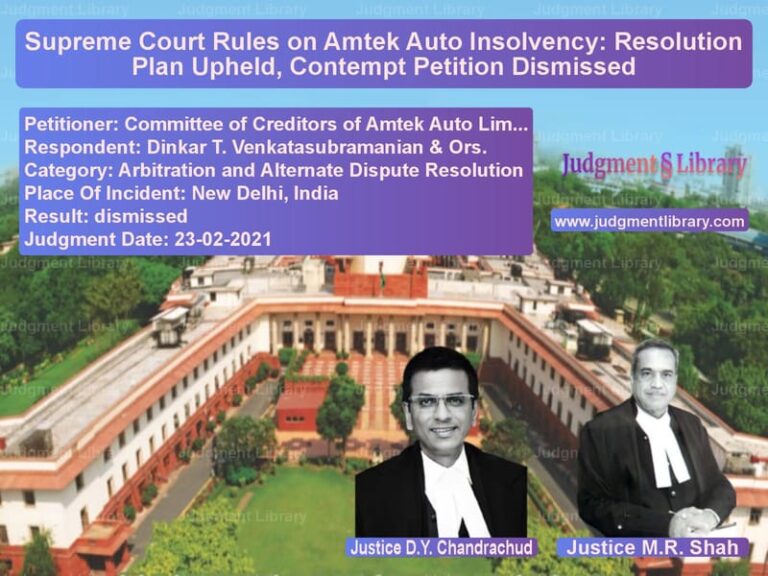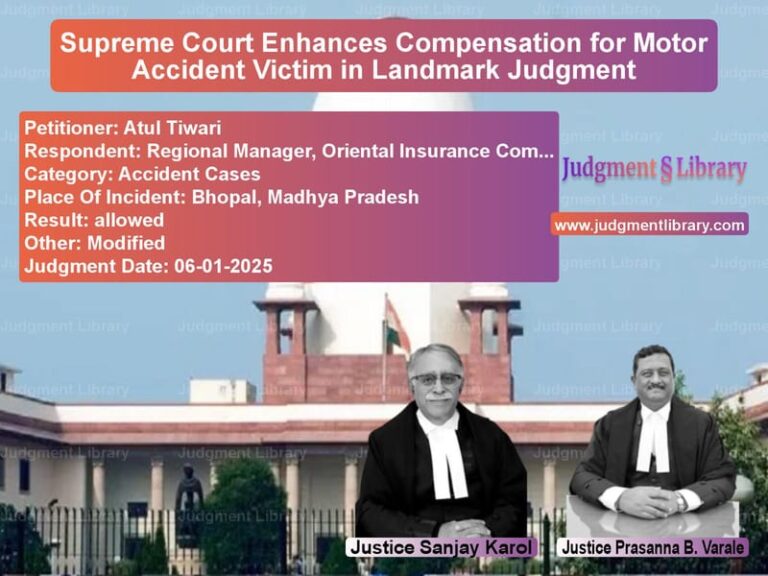Supreme Court Rules on Arbitration Dispute in ONGC Contract
On November 8, 2019, the Supreme Court of India delivered a significant judgment in the case of Mitra Guha Builders (India) Company vs. Oil and Natural Gas Corporation Limited (ONGC), addressing the arbitrability of liquidated damages under a construction contract. The Court ruled in favor of ONGC, holding that the levy of liquidated damages was an ‘excepted matter’ under Clause 2 read with Clause 25 of the contract and, therefore, not arbitrable.
Background of the Case
The dispute arose from two construction contracts awarded by ONGC to Mitra Guha Builders (India) Company on January 5, 1996, for the construction of multi-storeyed residential flats, a guest house, a multipurpose hall, and other facilities. The contracts included provisions for the imposition of liquidated damages in case of delays. When disputes arose over the levy of such damages, the contractor invoked arbitration under Clause 25 of the contract.
Justice P.K. Bahri (Retd.) was appointed as the sole arbitrator, and on July 1, 2005, he passed an award allowing the contractor’s claim and disallowing ONGC’s imposition of liquidated damages. ONGC challenged the award before the Delhi High Court under Section 34 of the Arbitration and Conciliation Act, 1996, but the Single Judge upheld the arbitrator’s decision.
ONGC then filed an appeal under Section 37 of the Arbitration Act before the Delhi High Court, contending that the levy of liquidated damages was an ‘excepted matter’ and, therefore, not subject to arbitration. The Division Bench ruled in favor of ONGC, setting aside the arbitral award. The contractor appealed to the Supreme Court.
Key Legal Issues
The Supreme Court examined two fundamental legal questions:
- Whether the levy of liquidated damages by ONGC under Clause 2 of the contract was an ‘excepted matter’ and thus outside the scope of arbitration.
- Whether the arbitrator exceeded his jurisdiction by adjudicating on a matter explicitly excluded by the contract.
Arguments of the Appellant (Mitra Guha Builders)
The contractor contended that:
- Clause 25 of the contract allowed for arbitration of disputes arising from the contract, and the arbitrator had the authority to decide on all matters, including liquidated damages.
- The High Court erred in interfering with the arbitral award, as the arbitrator had considered the evidence and found that the delay was partly attributable to ONGC.
- The imposition of liquidated damages was a penalty and should be adjudicated by the arbitrator.
Arguments of the Respondent (ONGC)
ONGC countered that:
- Clause 2 of the contract explicitly provided that the decision of the Superintending Engineer regarding the levy of liquidated damages would be final and not subject to arbitration.
- The arbitrator had exceeded his jurisdiction by deciding a matter that was contractually excluded from arbitration.
- The High Court correctly ruled that liquidated damages were an ‘excepted matter,’ and the arbitrator had no jurisdiction over it.
Supreme Court’s Observations
The Supreme Court carefully analyzed the contract provisions and made the following key observations:
1. Clause 2 and the Finality of the Superintending Engineer’s Decision
The Court ruled that the contract’s finality clause regarding liquidated damages meant that arbitration was not applicable. It noted:
“The decision of the Superintending Engineer regarding the quantum of reduction and justification in respect of reduced rates for sub-standard work will be final and not open to arbitration.”
2. ‘Excepted Matters’ and Arbitration
The Court reiterated the principle that when a contract specifically excludes certain disputes from arbitration, they cannot be referred to an arbitral tribunal. It relied on the precedent set in Vishwanath Sood vs. Union of India (1989) 1 SCC 657, stating:
“Where the contract clearly states that certain disputes are to be decided by a designated authority whose decision is final, such matters cannot be referred to arbitration.”
3. The Arbitrator’s Jurisdiction
The Court held that the arbitrator had acted beyond his jurisdiction by deciding on liquidated damages, which was an ‘excepted matter’ under the contract. It stated:
“The finality clause in the contract bars any further dispute on this issue, and the arbitrator’s intervention was unwarranted.”
Final Judgment
The Supreme Court concluded:
“The levy of liquidated damages by ONGC under Clause 2 was an ‘excepted matter’ and not arbitrable. The Division Bench of the High Court correctly set aside the arbitral award.”
Accordingly, the Court:
- Dismissed the contractor’s appeal.
- Upheld the High Court’s ruling setting aside the arbitral award.
- Reaffirmed that liquidated damages imposed by a designated authority under a contract cannot be arbitrated.
Legal Implications of the Judgment
This ruling has far-reaching implications for arbitration in construction contracts:
- Clarity on ‘excepted matters’: Contractual clauses designating final decision-making authority to an official or body must be upheld.
- Limits of arbitration: Arbitrators cannot adjudicate disputes expressly excluded by contract terms.
- Judicial review: Courts can intervene when arbitrators exceed their jurisdiction by deciding non-arbitrable matters.
- Contract enforcement: The ruling reinforces the principle that parties must adhere to agreed dispute resolution mechanisms.
Conclusion
The Supreme Court’s decision in Mitra Guha Builders vs. ONGC reaffirms the enforceability of ‘excepted matters’ clauses in contracts. By ruling that liquidated damages imposed under Clause 2 of the contract were final and non-arbitrable, the judgment provides clarity on the limits of arbitration in government contracts. This ruling ensures that contractual dispute resolution mechanisms are respected and prevents arbitrators from overstepping their jurisdiction.
Petitioner Name: Mitra Guha Builders (India) Company.Respondent Name: Oil and Natural Gas Corporation Limited (ONGC).Judgment By: Justice R. Banumathi, Justice A.S. Bopanna, Justice Hrishikesh Roy.Place Of Incident: New Delhi, India.Judgment Date: 08-11-2019.
Don’t miss out on the full details! Download the complete judgment in PDF format below and gain valuable insights instantly!
Download Judgment: Mitra Guha Builders vs Oil and Natural Gas Supreme Court of India Judgment Dated 08-11-2019.pdf
Direct Downlaod Judgment: Direct downlaod this Judgment
See all petitions in Arbitration Awards
See all petitions in Dispute Resolution Mechanisms
See all petitions in Institutional Arbitration
See all petitions in Judgment by R. Banumathi
See all petitions in Judgment by A. S. Bopanna
See all petitions in Judgment by Hrishikesh Roy
See all petitions in dismissed
See all petitions in supreme court of India judgments November 2019
See all petitions in 2019 judgments
See all posts in Arbitration and Alternate Dispute Resolution Category
See all allowed petitions in Arbitration and Alternate Dispute Resolution Category
See all Dismissed petitions in Arbitration and Alternate Dispute Resolution Category
See all partially allowed petitions in Arbitration and Alternate Dispute Resolution Category

